Love
-
Interview
published: 30 /
9 /
2016
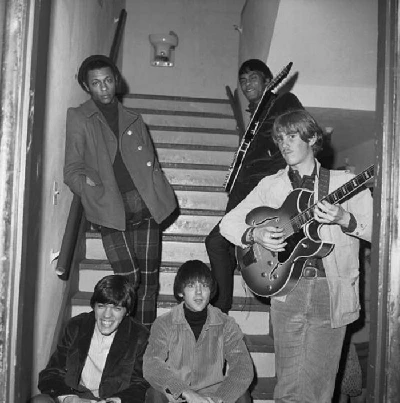
Anthony Strutt talks to Love guitarist Johnny Echols about his friendship with their front man, the late Arthur Lee; their relationship with Elektra Records and the making of their first three classic albums
Article
Love is one of the most important bands ever to come out of the Los Angeles music scene of any generation.
I first discovered Love in 1981 though a live cover by a pre -fame band who also came out of L.A, the Bangles who played a ‘Live Love ‘cover with the same energy as the original.
Love were a mixed race band formed around the friendship of lead guitarist Johnny Echols and the band's natural leader, vocalist and guitarist Arthur Lee. Sadly, since the late 1990s, the original band members have slowly started to sadly pass away. Two members departed us in 1998, bass guitarist Ken Forssi, leaving us in January of that year, only to be joined by rhythm guitarist Bryan Maclean passing away at the young age of 52 on Christmas Day. Arthur Lee sadly passed away in August 2006, which led his backing band, Baby Lemonade, to regroup alongside Johnny Echols as Love Revisited to remind the world of the legacy that Love left behind them.
I caught up with Echols at a show to talk about that legacy; his three albums with Lee, ‘Love’, ‘Da Capo’ and ‘Forever Changes’; Elektra Records and much, much more...
PB: I believe that both you and Arthur Lee were both born in Memphis, Tennessee and that you then moved to Los Angeles.
JE: Correct. Arthur was about nine and I was about seven.
PB: What inspired you to pick up a guitar? Was it the early rock and roll sound that inspired you?
JE: Actually a friend bought a guitar to school for a show, and he was taken to the nurse's office, and he asked me if I would hold his guitar for him while he was in there. I held it and I started to strum it, and the vibrations just touched something inside of me, I fell in love from that moment and I asked my father to buy me a guitar, and of course, he said, “No” (Laughs). So, I tried to build one myself and he saw that I was serious, so he bought me one.
PB: Apparently your guitar teacher was a member of the Coasters?
JE: Yes, he had been one of the side men in the Coasters.
PB: When did you first meet Arthur? Was it in Memphis or in L.A.?
JE: Actually our families go back to before we were ever born. My grandmother and his mother were best friends. They used to follow Jimmy Landsford's Orchestra and called themselves the Strumpets, because they liked the trumpet players, so we go back a very long time.
PB: When did you first get together musically?
JE: It would have been around '63. I was in high school and was playing in Billy Preston's group. (Preston later went on to have a successful solo career and also played on the Beatles’ ‘Let It Be’ - AS) .It was Billy Preston and The Soul Brothers, and we were playing in assembly. Arthur heard us play, and he saw all the attention that we were getting from all the girls and wanted to be part of that.
At the time Arthur wasn't a musician. He was a basketball player and he wanted to join the group, but he couldn't play an instrument, other than an accordion, so we let him play some bongos and congo drums, and later on he became a capable vocalist. That's how he started singing. Our first band together with him singing was called the American Four and then we tried to emulate Booker T and The MG's, so we became Arthur Lee and The LAG's., which stood for ‘L.A. Group’.
PB: I believe, around about this time that you were playing with Billy Preston, you also toured and recorded with Little Richard and that you came under age to the UK on a passport with him.
JE: That was in '64. That was with Little Richard and Jimmy James who became Jimi Hendrix. He was Little Richard's valet at the time and we came over, but we had to leave. That's when we first met the Beatles.
PB: What was the early Jimi Hendrix like then?
JE: He was a journeyman guitar player. I would call him an average guitar player. The guy that became Jimi Hendrix must have gone to the crossroads and worked out a deal because he wasn't the same guy at all (Laughs). A couple of years later he went from being this a guy with a guitar to being this master…
PB: I have pretty much all of Love's recordings and I have an early release of 'Black Beauty'. (‘Black Beauty’ was an unreleased at-the-time lost album from 1973, and was recently released officially on vinyl for the first time-AS). If features your earliest recordings as the LAG’s, the tracks being' The Ninth Wave', ' Rumble-Still-Skins', the American Four have a track on it called 'Soul Food', and there is with another LAG’s song one of my personal favourites songs of all time, ‘Luci Baines’.
JE: ‘Luci Baines’ was written for the president's daughter. We had seen her on a few local news shows, so we wrote the song about her and they weren't too pleased with it because our parents got a visit from the secret service, asking why we would write a vulgar song about the president's daughter. Back, then, they took stuff like that very seriously.
PB: There is one other song on it, ‘It's the Marlin, Baby’, which is for a car advert…
JE: That was a car called the Marlin. We were asked to do a commercial for it, so they took us to the advertising office and they recorded this crap. They had no plans on using it until we started to make it and then they thought we could make some money so they released it.
PB: In '65, The Byrds came onto the L.A. scene. Do you think the L.A. scene changed with their arrival, because after the LAG's and the American Four you became the Grass Roots?
JE: Yes.
PB: Do you feel that with the Grass Roots that it was the first real band that you were making progress with?
JE: Yes, we thought that was the one that would go to the next level. Then Lou Adler decided to do some skulduggery so he copied our name and used it for his backing band which was made up of studio musicians. They thought that they would get a bump in the charts because people would think it was us. Well, the people in Hollywood bought it and it sold well.
PB: I read that it was this band that evolved into 'Love', but that you had a rather novel way of choosing your name where you played a gig and then gave the audience a selection of names including 'The Love'.
JE: Yes, that is sort of how it was, but we had in fact already trademarked the name 'Love' before we asked the audience. We had already had decided that that would be our name.
PB: Jac Holzman of Elektra Records discovered the band in the winter of '65. Were you aware of Elektra at the time? They were by then quite a respected folk and jazz label.
JE: At the time we didn't know anything about Elektra, but Jac came down and heard us play and offered to sign us. We had already been offered a deal with Columbia and RCA and a couple of others. We had it in our minds though that we wanted to own the publishing for our stuff and Elektra were the only ones to let us own our own publishing, so that's why we went with them.
PB: You were Elektra’s first rock act, weren’t you?
JE: Yes, that is correct. They had the Paul Butterfield Blues Band on there as well, but we were their first rock band.
PB: The Doors also eventually signed to Elektra. In John Densmore's autobiography, he says that if they had a bad night or time they would always see Love as an inspiration. They just wanted to be as good as Love. Is that a compliment to you guys?
JE: Well, of course, it's a compliment. They came to all of our gigs, Jim was basically a groupie. He would always be hanging out around us and after a while he became a pest, but we could see how talented he was and the aura which he projected on stage.
We had a deal with MCA to sign with them, but we had a brilliant idea. We thought if we could hook them up with the Doors that then Elektra would let us out of our contract. Jac Holzman, hated them the first couple of times he saw them because Jim was drunk, and he came back a third time and this time Jim wasn't drunk. They were playing opposite Iron Butterfly, so they were on their best behaviour. Jac heard them how we heard them, so he worked out a deal with them to sign them.
PB: Would you say that your early years as Love were the happiest of times for the band?
JE: It was probably the most productive of times. We lived together. We saw each other every day. We were very good friends, so yes.
PB: You lived in a place called the Castle. Is it true that it was Bela Lugosi's house?
JE: No, it belonged to the actress Lillian Gish and she had moved to Paris. The house had become a bit derelict and she wanted us to take care of its taxes and the upkeep, so we were allowed to live there basically just for taking care of it.
PB: Apparently 'Love', the first album, was recorded in a mere four days over a twenty-one hour period. Were you happy with the results?
JE: No, because it didn't sound like the live show. That was the beginning of the end of our relationship with Elektra because we expected them to emulate the live sound and all its dynamics and they weren't able to do it. It was all “We will fix it in the mix”, and they didn't. We had our sound, we had our instruments loud, and we were a loud and raw band and we wanted to project that on record, but they couldn't do it.
PB: In the mid-60s, the world was changing dramatically? Do you think the L.A. scene was changing dramatically with the times?
JE: I think music in general was changing. I wouldn't just associate that with the L.A. scene. The Beatles sent us tickets to see them at the Hollywood Bowl, and seeing them we knew then that music was changing because of the way the audience reacted to them and how they put their chords together. You had basically had a four chord song, and then these guys had a 7th chord and a minor 9th and different types of chords, so it made everyone a bit better as musicians.
PB: Did you tour much for that first record?
JE: We toured when we could. We did a lot of tours on the West Coast and we went to Dallas and Chicago and Detroit and places like that. But we were a multi-racial mixed race group and we were living in polarised times, so we weren't allowed to play in certain places in the South and the Mid-West, so we played where we could.
PB: You quickly followed up ‘Love’ with ‘Da Capo’, but you moved in a completely different direction with it. Did you not want to repeat yourselves? The first album was garage rock, whereas ‘Da Capo’ was a bit more progressive.
JE: The first album was just like a live show in the studio. It was a live in the studio album in which we played all the instruments at the same time. With the second album, we wanted to do something,a bit more jazzy and where our hearts were.
PB: That was the album that produced ‘7& 7’ which is an all-time garage classic.How did that come about?
JE: That song is a sort of autobiographical number from Arthur. It is a bit Dylan-ish, and when we rehearsed it Kenny and I had gone to Box Studios and they gave him a bass pedal and it had this big sound, so we tried to come up with something to showcase that.
PB: It also showcased for possibly the first time a whole side dedicated to one song with ‘Revelation’ How did that come about? It's a just under nineteen minute jam.
JE: When we played it live sometimes, that was the whole set. And that was our signature tune. We were one of the first jam groups to do that. The Grateful Dead came after that. But we were one of the first and that was kind of our signature so we wanted to do that in the studio, live with an audience, but the Musicians Union wouldn't allow it. We did an hour and a half long track, and it was cut down to eighteen minutes. We started it off with raw blues, but most of it is missing. The first guitar solo has no amplification. It was meant to progress into jazz, then blues, but they just sliced it up. I had fifteen minutes of some of my best solos I have ever played, and they were all removed.
PB; A lot of people say ’Forever Changes’ is the greatest album of all time. At the time of recording, did you know this was something really special?
JE: We knew the songs were special. Yes.
PB: Was it easy to record? Session musicians were apparently called in for the start of the recording.
JE: Well, that's not quite true. We were originally promised a double album, So Bryan and I had written songs to be on the double album, and this was going to be our magnum opus. When we got to the studio, we were told that it was going to be too expensive and that we couldn't do it, but we would do the second part later. Bryan was really upset and basically just withdrew, and so the normal things he would play he didn't play anymore. The songs didn't sound right, so they brought in session musicians and they tried playing like us but they couldn't, so the one song they played with us was 'The Daily Planet'. That didn't sound like us, so they went home and we were offered extra money to finish ‘Forever Changes’ which we did, although unknown to any of the rest of us Arthur had also been offered a solo deal,.
PB: it was the time of the Vietnam War. Did you all fear the draft?
JE: Absolutely, Every day we were worried that we would be snatched up to be put in some jungle or worse.
PB: 'You Set the Scene' on ‘Forever Changes’ was three songs put together that were apparently not finished. Was that the only time that you did that?
JE: Yes, that was the only time that we combined three songs together to make one.
PB: ‘Live and Let Live’ is about Arthur Lee's nightmares of his own death. I assume you saw friends come back from Vietnam as changed people.
JE: Exactly, and many of them didn't come back at all.
PB: There was talk of an album from the original band which remains unreleased called 'Gethsemane'
JE: Bryan had an album called' ‘IFYOUBELIEVEIN' (which was finally released on Sundazzled’ in 1997 -AS). ‘Gethsemane’ was my part and ‘Forever Changes’ was Arthur's part, and was all meant to be put together as one complete album to be titled ‘Forever Changes’.
'Gethsemane' was the title chosen by me because I was so upset. I felt like it was like the biggest betrayal. I was still a kid and seventeen/eighteen when we recorded our three albums together, and I felt that we had been betrayed by each other and the record company. That was where Jesus was betrayed by Judas in the garden of Gethsemane, and that's why I chose that title,
PB: Why did the original band split? Arthur lee recorded a fourth Love album with Elektra called 'Four Sail' with a different line up? ‘Forever Changes’ only charted at no. 154. Did you feel you put in all this work and it hadn't taken off?
JE: No. As I said, Jac Holzman had also offered Arthur a separate record deal, which we didn’t know about,and Bryan called to say that Jac had called him up and that they were going into the studio to record. I said, “Let's talk to Arthur,” and we went over to Arthur's house, and he said “I'm really proud of you, Bryan. You’re fired.” That's how it happened, and, and he went behind our backs and did that, that bond of trust that we had all had for all those years was basically gone. It was all down to Jac Holzman really.
PB: What happened to you after that?
JE: I became a session player. I went to New York, and I did some sessions and played both blues and jazz. Mostly though.I did Japanese commercials because we had a good agent, and he got me that. I was probably earning four or five thousand dollars a week, just doing commercials, but it was just a 9-5 job.
JE: Thank you.
Band Links:-
http://www.lovearthurlee.com/
https://www.facebook.com/Arthur-Lee-Lo
http://www.love-revisited.com/
https://www.facebook.com/LOVE-revisite
Picture Gallery:-
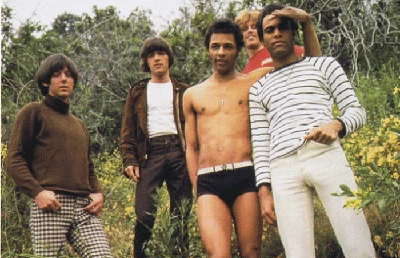
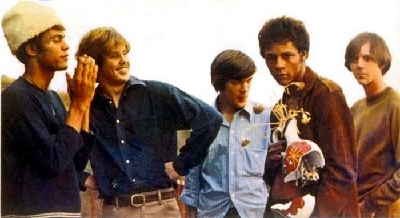
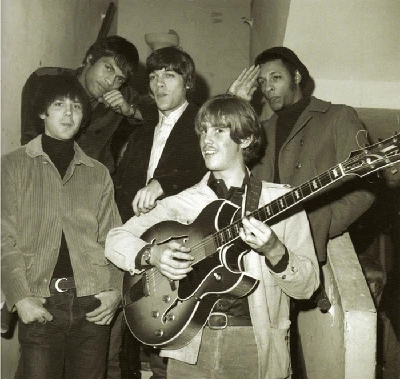
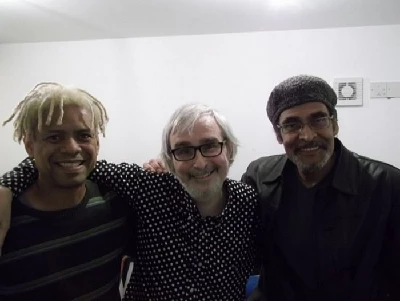
Visitor Comments:-
|
|
873 Posted By: Celia, Leicester on 22 Jul 2018 |
I sat in on this interview and both Anthony as Johnny were amazing. I hadn't until this time realised how much research Anthony did before he interviewed anyone. It was great to see him doing what he loved and hearing about Johnny's amazing journey through life. Always treasure what you have x
|